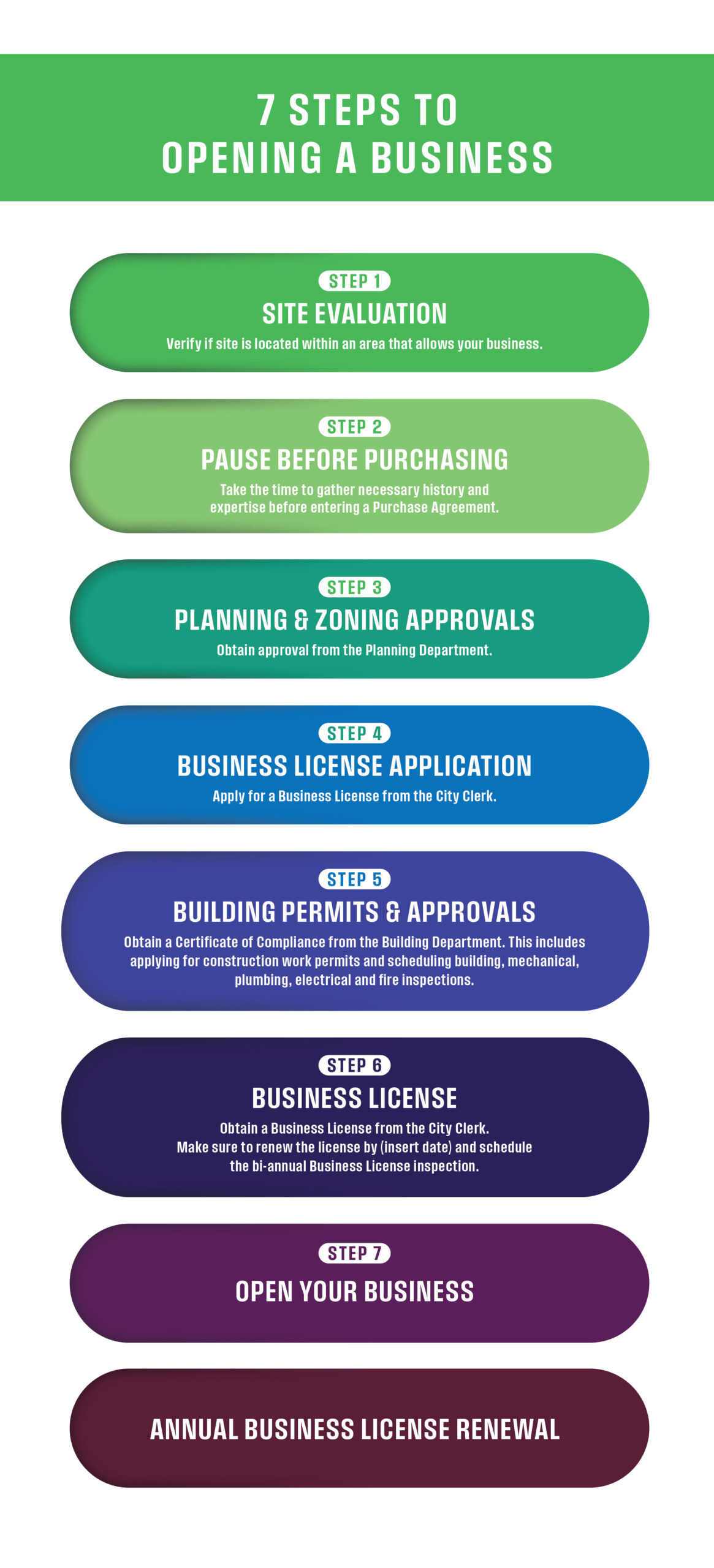
Welcome to Washtenaw County! We’re thrilled that you are interested in setting up a new brick-and-mortar business in our community, and we’re here to help you navigate the process. Ann Arbor SPARK supports small businesses in any industry and at any stage, and can provide resources and referrals throughout this complex journey.
To help you get started, we’ve simplified Washtenaw County communities’ small business development process into a series of 7 steps and a full technical glossary to move your brick-and-mortar business moving from ‘great idea’ to grand opening. Be sure to contact the SPARK Business Development Team at BusinessDevelopment@annarborusa.org for support during each step of the way.
Important Note: Before exploring potential sites, we highly recommend reviewing the Michigan Small Business Development Center’s (SBDC) Guide to Starting and Operating a Small Business. This resource outlines essential milestones in developing your business idea—including planning for operations, finances, legal matters, and strategic communications—and identifies crucial steps to consider before purchasing property.
Are you ready to find the perfect place for your brick-and-mortar business in Washtenaw County? Let’s go!
Step 1: Site Evaluation
Ensure your desired location suits your business type and complies with zoning regulations.
When exploring properties in Washtenaw County, identify and visit sites that appeal to you. Assess the area for established businesses, customer base, traffic flow, and parking availability. To understand the future vision for this area, we recommend reviewing any of the locality’s published planning documents — such as Economic Development Plans, DDA Plans, Corridor Plans, Master Plans, among others — to ascertain local business attraction goals and incentives.
Once you have some sites in mind, contact the owner or leasing agent to learn about the property’s history and the leasing or purchasing process. This information will help you understand the investment needed to acquire, renovate, and maintain the space.
Most importantly, review local ordinances to understand any land use restrictions and ensure zoning compliance—your intended use must adhere to local zoning regulations dictating how properties can be used and designed.
Step 2: Pause Before Purchasing
Take the time to gather necessary history and expertise before entering a purchase agreement.
If you plan on purchasing and developing a property, you’ll want to conduct a title search to identify all legal documents associated with the property (including the master deed, easements, development history, sales history, liens, and so forth). You can also contact the City, Township, and/or Washtenaw County to obtain all records of that property from the Assessing, Planning, and Building Departments to learn more about the history of the property.
At this stage, assemble a team of experts to support you, including an engineer or an architect (who will help you in preparing building design and construction plans), a land use attorney (who will help you navigate the legal processes of property purchasing and development), and an environmental specialist (who will help you assess a property or designs for any environmental hazards or impacts). As you begin to hire the members of your team, verify that these professionals have a good track record and align with your budget. If you do not know where to find these experts, you can ask the locality for a list of architecture and engineering firms that have submitted projects over the last year, or contact Ann Arbor SPARK for a list of our preferred providers.
Before purchasing your property, you will enter into a Purchase Agreement. This contract to purchase a property will include information like the property address and price, the rights and obligations of the buyer and seller, as well as any contingencies that must be resolved before the sale is binding. A Purchase Agreement includes a due diligence period to acquire all necessary approvals prior to the purchasing of property, which lasts 60-90 days and starts when you sign the Purchase Agreement.
Step 3: Planning & Zoning Approvals
Contact your community’s Planning Department to understand and obtain necessary approvals and schedule a conceptual or pre-application meeting.
Call or email the Planning and/or Community Development Department to confirm that the structure and/or use you are considering complies with the Zoning Ordinance. You will be prompted to apply for Zoning Compliance to verify this. At this stage, the Planning Department will confirm with you whether additional planning and zoning approval is required for you to move forward with establishing your business on the site, including a Site Plan Review or a Special Land Use Permit.
The Planning Department will inform you of all required processes. If required, you’ll be prompted to apply for Site Plan approval and/or a Special Land Use permit, which will involve paying associated fees.
If Site Plan Review is required, you must prepare preliminary sketch of Site Plan and schedule a Pre-Application meeting with the Planning Department, if they are offered. Bring an architect or engineer who is creating the Site Plan. If the project involves new construction, the City Engineer and Fire Marshall will be included. Following this pre-application meeting, your architect or engineer must prepare site plans based on Planning Department (and City Administration) feedback. The Site Plans are to be submitted to the Planning Department, and you must make revisions and subsequent resubmissions in response to any feedback.
Depending on the scope of your proposed renovations or development, your Site Plan may be reviewed for approval administratively, or at a scheduled Planning Commission Meeting. If the Site Plan follows the Zoning Ordinance, other applicable City planning documents and laws, and state and federal statutes, your Site Plan will be approved and it will be indicated in the plan.
A Special Land Use Permit is required if you propose a unique land use for your business that would not otherwise be permitted in that particular zoning district. Localities review special land use permit applications to ensure the proposal is located, designed, and operated in a manner that is harmonious with neighboring developments and does not adversely affect public health, safety, and general welfare.
After submitting your Special Land Use Permit application, the locality will hold a public hearing at a Planning Commission meeting to hear comments from residents and discuss whether your proposal satisfies the standards for special land uses and all other applicable standards of the Zoning Ordinance.
Following this meeting, the Planning Commission will make a recommendation to approve conditionally approve or deny the special land use permit.
* Step 4: Business License Application
If required by your intended community, apply for a business license.
If you are planning on hiring and paying employees, you’ll need to register your business with the State of Michigan and acquire the required tax identification status in any states in which you have full-time W2 employees. Through this process, you’ll apply for and receive an Employer Identification Number (EIN) from the Federal Government.
Another important step to business development is acquiring all necessary licensing to operate in compliance with local, state, and federal law. Some, but not all, small businesses will require state licensing for operation. Check with Michigan’s Secretary of State’s office or Michigan’s Department of Commerce to confirm if you need a state license.
In some cases, you may also need to acquire local or county operating licenses for operation. Check to see if your intended community requires business licenses for your particular use (including child care licenses, liquor licenses, food handling licenses, and so forth). If so, you’ll need to apply for a Business License (often through the City Clerk of the Building Department).
Step 5: Building Permits & Approvals 
Obtain a Certificate of Occupancy from the Building Department. Including applying for construction work permits and scheduling inspections (building, mechanical, plumbing, electrical, & fire).
Before you open your business and occupy your building, you’ll need to obtain a Certificate of Occupancy. If required by your community’s Building Department, you will be prompted to prepare and submit construction plans detailing your intentions to repair, renovate, or add to your building.
You can send a licensed contractor to apply for all work permits related to building additions, repairs, or renovations, and pay any associated fees. Following construction, you must schedule work permit inspections (including mechanical, building, electrical, and plumbing) for the community to verify that all construction is of high-quality and up to local code. If you do not pass the inspections, you must perform revisions and schedule re-inspections. A Fire Marshal inspection must also be scheduled and passed.
If required by the Building Department, a final Certificate of Compliance inspection must be scheduled and passed. Remember, a Certificate of Occupancy will not be issued – and therefore, you cannot occupy the building itself — until all fees are paid, permits are approved and finalized, and the work covered by a building permit has been completed in accordance with the permit, the code, and other applicable laws and ordinances.
*Please note that each community in Washtenaw County will have a slightly different permitting and permit application process. Please refer to these websites for more information about these community-specific processes and contacts below:
* Step 6: Final Approvals, Business License and Renewal 
If required by your intended community, ensure you have obtained and renewed your Business License and any additional permits.
If your community requires business licensing for operation, you will receive your business license after all other department and agency approvals are received. Importantly, these business licenses will come with an expiration date. At this time, you’ll want to clarify with the licensing body the process and timeline for the annual renewals and any required inspections for upkeep of your business license.
At this stage, you’ll also be thinking about the final touches for your brick-and-mortar business, likely including signage on your façade. Carefully refer to the Zoning Ordinance to ascertain any restrictions and regulations around sign design and placement; oftentimes, permit and temporary signs require a permit before they are hung. Submit a Sign Permit application and pay any associated fees.
Step 7: Open Up Shop! 
Congratulations! You are ready to open your brick-and-mortar business. We commend your effort to contribute to Washtenaw County’s diverse small business economy. If you’re looking to hire local talent, Ann Arbor SPARK offers targeted talent acquisition support and a job portal to help you tap into the region’s workforce.
Remember, Ann Arbor SPARK is here to not only help you arrive in Washtenaw County, but to help you thrive in Washtenaw County. If you are looking for more small business development resources, our Business Development Team offers small business mentorship and networking, co-working spaces, and start-up funding, among other resources. Contact us today to find out more about how our offerings can best match your needs.
We also encourage you to check out the Michigan SBDC webpage for live and on-demand business trainings, free appointments with business consultants, and a library of downloadable business planning guides and templates.
Washtenaw County Community Information
*Please note that each community in Washtenaw County will have a slightly different permitting and permit application process. Please refer to these websites for more information about these community-specific processes and contacts below:
Glossary
- Certificate of Occupancy: A document issued by a local government agency or building department certifying a building’s compliance with applicable building codes and other laws, and therefore indicating that it is in a condition suitable for occupancy.
- Due Diligence Period: A set number of days that you have to get the necessary confirmations and approvals from the community before you are bound to purchasing the property.
- Purchase Agreement: A documented agreement between a buyer and seller that outlines the legal terms of a real estate transaction.
- Site Plan: A document that details your site’s current conditions and your proposed changes. It is a technical document that should always be prepared by an architect or engineer. A Site Plan is a detailed map of the property that typically includes:
- A scaled drawing of the property
- Property lines
- Location of existing trees and vegetation
- Existing and proposed buildings
- Driveway entry and exit locations, roadways, and sidewalks
- Utility poles and power lines
- Fencing
- Other on-site structures, such as sheds, generators, etc.
- Site Plan Review: A systematic assessment of land development proposals, established by a local ordinance, by which a local planner or official ensures that a proposal is consistent with land development policies, regulations, and accepted land design best practices prior to issuing a building permit.
- Special Land Use Permit: A legal document that allows a piece of property or land to be used in a manner that deviates from the zoning regulations in the area. These permits create “exceptions” to the Zoning Ordinance, and typically require that this exception will not cause any adverse impacts to the neighboring area.
- Zoning Compliance: The desired use of this property adheres to local zoning regulations.
- Zoning Regulations: Established in the local Zoning Ordinance, regulations that dictate how property in specific areas within a locality can be used and designed.











